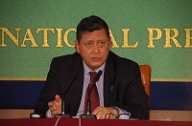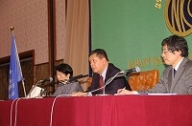Statement by the UN Special Rapporteur on the Situation of Human Rights in the Democratic People’s Republic of Korea at the end of his visit to Japan, 16 to 20 January 2012
Press Release 12-003-E 2012.01.20
Good afternoon ladies and gentlemen. Thank you for coming for the press conference this afternoon.
As the United Nations Special Rapporteur on the situation of human rights in the Democratic People’s Republic of Korea (DPRK), I was on an official visit to Japan from 16 to 20 January 2012. The main objectives of my visit were to assess the human rights situation in the DPRK and its impact on countries in the region, such as Japan. In particular, I was focusing on the question of abduction of Japanese nationals by DPRK agents. My current visit to Japan is a part of my visit to neighbouring countries such as the Republic of Korea (RoK) that I undertook in November 2011.
During the last 5 days, I held several meetings with the Government Officials, such as the Minister of Foreign Affairs, the Minister in-charge of abduction issues, the Deputy Vice-Minister for Foreign Policy of Ministry of Foreign Affairs, the Ambassador in-charge of UN affairs, the Deputy Director General of Asian and Oceanian affairs. I also interacted with national and international non-governmental organizations, diplomats, and other relevant individuals working on the human rights and the humanitarian situation in the DPRK. I ensured that I spent substantial time listening to the families of abducted Japanese nationals and visited the cities of Niigata and Kashiwazaki in Niigata prefecture, where five Japanese nationals were abducted in 1977 and 1978.
While in Niigata and Kashiwazaki, I was given a thorough briefing by Niigata prefectural police about the deplorable acts of abduction of Megumi Yokota, Kaoru Hasuike and Yukiko Hasuike. Step by step accounts of what took place on 15 November 1977 and 31 July 1978 during the abduction of the three Japanese nationals were described to me. While Kaoru Hasuike and Yukiko Hasuike were returned to Japan in October 2002 there has been practically no progress made in re-launching a full scale investigation into Megumi Yokota and 11 other pending cases of abduction of Japanese nationals, as promised by DPRK authorities during the Japan-DPRK working level talks on abduction held in August 2008. I wish to reiterate my position on the question of abduction that DPRK should stand by its commitment made to Japan of re-investigating the 12 pending cases of abduction. The urgency of the matter is clear, the abductees are getting old, and so are their family members, here in Japan. In this regard, it is important to maintain a sustained pressure on DPRK until such time a satisfactory outcome is achieved.
Most human rights issues that there were highlighted during my visit to the Republic of Korea (RoK) in November 2011 were brought to my attention here in Japan as well. The information gathered during the meeting with the defectors from the DPRK, who are currently living in Japan strengthens numerous reports of a dire humanitarian situation, in particular the serious shortage of food, and the critical human rights situation in DPRK. I also heard with concern that asylum seekers from DPRK are being refouled by some neighboring countries, and the border control has been tightened over the last month or so, which makes fleeing from DPRK more difficult.
Since my visit to the RoK in November 2011, there has been a major development inside DPRK, which is the change in leadership of the country. The ramifications of this change on the people of DPRK, and on neighboring countries will only unfold in the comings days and months. However, I am hoping that the new leadership in DPRK will use the change in leadership as an opportunity to engage with the international community and secure global confidence. The world is eagerly looking at DPRK to see what lies ahead, and hoping that the authorities will take measures to improve the human rights situation of the people of DPRK.
I call on the new leadership to address all questions and concerns in relation to human rights, and resolve outstanding issues such as the issue of the abduction of Japanese and other foreign nationals without further delay. I am very confident that positive engagement with the international community will be welcomed from all quarters, as has been the case with Myanmar, where the adoption of reform processes are welcomed widely.
I have not yet approached DPRK since the succession of leadership in December 2011. In the coming days, I will approach DPRK authorities for a meeting, as well as a request to visit the country, with the hope that the authorities would change their course of action and interact with me, as the Independent Expert on the situation of human rights in DPRK.
On a final note, I would like to extend my sincere appreciation to the Government of Japan for their warm reception. During this mission, I not only held discussions, but also established contacts and identified individuals and groups that I wish to meet during my future missions to the country. I am encouraged by the prevailing interest in the human rights situation in the DPRK among various actors here in Japan. The findings from my mission to RoK and Japan will be reflected in my report to the Human Rights Council in March 2012.
ENDS
Link to the video (Japan National Press Club’s YouTube site )
* *** *




